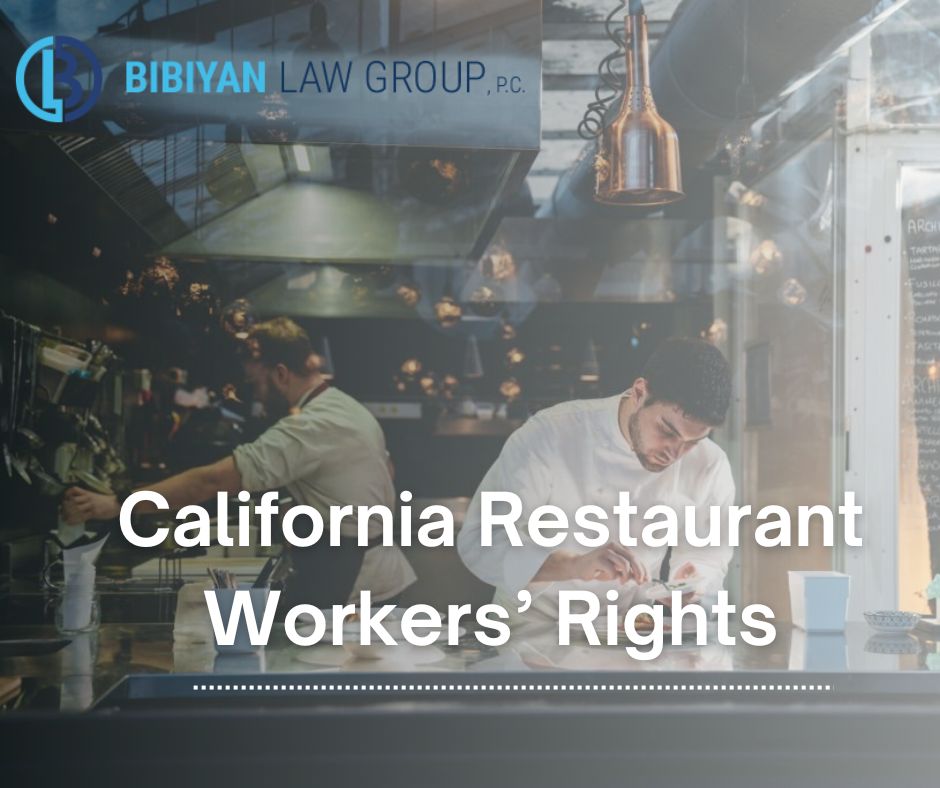
Restaurant work can be very different from other work that people perform, and, on a federal level, tipped workers who receive more than $30 per month in tips are entitled to only $2.13 per hour in direct wages. These numbers can be disheartening, but if you work in a restaurant in California, you are entitled to far more compensation. You have multiple rights that protect your financial well-being and your health. In this article, we dive into California restaurant workers’ rights and how to assert them when your boss engages in unlawful behavior.
Should your employer fail to respect your rights, our skilled and passionate Los Angeles employment attorneys at Bibiyan Law Group, P.C., can ensure you receive the legal relief you deserve. We are experienced, are aggressive about protecting mistreated employees, and focus exclusively on employment law matters.
What Are My Wage Rights?
California restaurant workers’ employment rights include the right to receive minimum wage and overtime pay.
Minimum Wage
California’s current minimum wage is $15.50 per hour, which will increase to $16 per hour on January 1, 2024. Depending on where you work in California, the current minimum wage might be higher.
Overtime Pay
Not only are you entitled to the minimum wage for your labor, but you are also entitled to overtime premiums when you work more than a standard number of hours in a day, hours in a week, or days in a week. Overtime premiums in California apply as follows:
- At least 1.5 times your hourly rate for any time you work more than 8 hours in a day,
- At least 1.5 times your hourly rate for any time you work more than 40 hours in a week,
- 1.5 times your hourly rate for the first 8 hours you work on your seventh consecutive workday,
- 2 times your hourly rate for any time you work more than 12 hours in a day, and
- 2 times your hourly rate for any time you work more than 8 hours on your seventh consecutive workday.
Whether out of carelessness or an intent to shortchange their workforce, many employers pay their employees less than they are entitled to. So, it’s a good idea to regularly inspect your timesheets and pay stubs to ensure you receive the pay you deserve.
What About My Tips?
In a discussion about restaurant worker rights in California, your top question might be about how your employer should handle tips. Under the law, a tip is any amount a patron gives you above the amount they owe for the services or goods purchased.
You should know that tips are the sole property of the employee or employees who were given the tips. This means that your employer cannot keep any portion of a tip that a patron gave you. California law also prohibits your employer from using any tip you receive as a credit against your wages and from making wage deductions from your tips—you are entitled to your tips in addition to minimum wage. Additionally, your employer cannot deduct credit card processing fees from your tips.
The math regarding your right to tips becomes trickier when your employer has a pooling policy. Your employer can require you to share your tips with bartenders, bussers, and other restaurant staff who were part of the chain of service to the patron as long as no portion of your tips goes to an owner, supervisor, or manager.
Break Rights
California restaurant employee rights include break rights. If an employer denies you legally required rest or meal breaks, your employer’s denial is wage theft. Depending on how many hours you work, you should receive the following breaks during your workday:
- A 10-minute rest break for every 4 hours you work, and
- A 30-minute meal break if you work more than 6 hours (including a second 30-minute meal break if you work more than 12 hours).
Remember that your meal breaks are unpaid, but your employer must pay you for your rest breaks.
Paid Sick Leave
Most California workers have the right to receive Paid Sick Leave (PSL) for up to three days to address the following:
- Seeking a medical diagnosis, preventive care, or treatment;
- Caring for a family member with medical needs; or
- Recovering from a physical or mental illness or injury.
To be eligible for this right, you must have worked for your employer for at least 30 days in a year and completed a 90-day employment period.
Addressing a Violation
When your employer fails to follow state wage and break laws, you can sue or file a wage claim with the California Labor Commissioner’s Office. If you win your claim, your employer might owe you damages for your financial losses and penalties. Depending on the facts, you have between one year and four years to file your claim, so the best way to preserve your options and recoup all compensation you are owed is to hire an experienced attorney.
Contact Bibiyan Law Group
At Bibiyan Law Group our large and experienced legal team takes your livelihood seriously. Our LA employment attorneys have many years of combined experience, and we are aggressive with employers who behave unlawfully. If you need a skilled advocate, our team is right for you. Please call or contact us online to set up a consultation. Hablamos Español.


